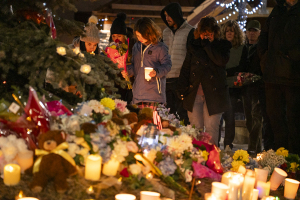Find your secret place: Importance of where you pray (book excerpt)

Jesus said something about prayer that I find surprising (which is not surprising). His first piece of advice was not about what to pray but where:
When you pray, go into your room, and when you have shut your door, pray to your Father who is in the secret place, and your Father who sees in secret will reward you openly.
The word Jesus used for “room” is tameion in Greek, and it can also be translated “inner room.” Within a typical first-century Galilean home was an inner room, kind of like a closet or pantry, used to store food stuffs and supplies. Most of life was spent outdoors, so the home was mostly for sleeping and storage. Jesus’ advice was to go hide in the tameion and there, “in secret,” pray.
I’m writing this book from a little office in an Oregon forest. It’s quiet, and the only distractions are those I brought in my own mind. Why here and not on a street corner downtown? Because I’m a person, in a body, and environment matters. Certain environments help me focus on my work, while others sabotage my best intentions.
In the same way, if we want to reach the depth of life with God that Jesus modeled, we need to find a diversion-free place to get away and be alone with the Father. It could be an office in the woods, your bedroom late at night, or a park down the street from your house. Or if all else fails, a closet or pantry.
The point is that, like Jesus, we need to learn to hide.
When you read the four biographies of Jesus in the New Testament, one thing is painfully clear: Jesus’ life template was based on a rhythm of retreat and return, like breathing in and then out. Jesus would retreat: He would slip away from the noise and press of the crowd and find a place where He could pray, alone or sometimes with a few very close friends. He would inhale. Then He would exhale, or return: He would come back to preach and teach and heal and deliver and offer love. In Mark 1, we read,
“Very early in the morning, while it was still dark, Jesus got up, left the house and went off to a solitary place, where he prayed.”
The phrase “solitary place” is one word in Greek: erēmos. It can be translated “deserted place,” “lonely place,” or “quiet place.” In Luke 5, we read the same word again:
“Jesus often withdrew to lonely places [erēmos] and prayed.”
Notice, He often withdrew to the erēmos. On the night before His arrest, Jesus went to Gethsemane, a park outside the city of Jerusalem. The writer Luke tells us he went there “as usual.” One version has “as was His habit.” And the writer John added that the betrayer Judas knew to go there “because Jesus had often met there with His disciples.”
For Jesus, the secret place wasn’t just a place; it was a practice, a habit, a part of his life rhythm. He seemed to have little hiding places all over Israel where he would slip away to pray.
This practice from the life of Jesus has come to be called “the spiritual discipline of solitude, silence, and stillness.” And no matter your personality type, whether you are a thinker or more of a doer, an introvert craving time alone or an extrovert ready to party “all day every day, baby,” this practice is absolutely vital to your spiritual life. Henri Nouwen once said, bluntly but accurately,
“Without solitude it is virtually impossible to live a spiritual life.”
There’s a legendary story about Nouwen going to ask Mother Teresa for spiritual direction (to be a fly on that wall . . .). Her advice was spartan: “Spend one hour a day in adoration of your Lord and never do anything that you know is wrong.”
For many of you, an hour a day may be unrealistic. But could you do a half hour? Twenty minutes? Surely you could begin with 10?
We all have excuses for why it’s hard to make time to pray, but many of them are just that — excuses. A push-pull dynamic is at work within all our hearts (myself included). Part of us deeply desires God, and part of us resists him and wants to rule over our own kingdoms, thank you very much.
But one reason so many people avoid the quiet is just because they have yet to find a way of being with God that is conducive to their personalities and stages of life. Yes, I’m an introvert. No, I don’t have little kids anymore. Yes, I live in a house, not a tiny apartment. But I think of my friend Tyler who is nothing like me—full-tilt extrovert, action-oriented, father to three young boys. He goes to bed early and gets up every single day at five a.m. (because it’s the only time he’s not needed); he goes outside, prays a psalm on his porch, then goes prayer walking in a park across the street. He does this all year long, including all through the Portland winter. “The cold just makes me feel so alive,” he confided in me (when I asked if he was crazy).
Tyler and I have very different personalities, but we share an ache for God and we have both come to love prayer. I do it sitting cross-legged in the quiet of my room; he does it walking in a city park in a raincoat. Different method, same goal.
When the secret place is turned into a preference-based devotional option for introverted intellectuals, it’s a great tragedy — similar to how in the Middle Ages a serious pursuit of Jesus was perceived as only for monks and nuns, not ordinary people. It’s a tragedy for extroverts because they never reach the depth of life with Jesus that is on offer. And it’s a tragedy for introverts, too, because a spiritual discipline that was designed to free us from ourselves and form us into people of self-giving love is twisted into “a little me-time for Dad to recharge,” which often does nothing but deepen our bondage to self, not liberate it.
So, work with your personality, not against it; tailor your practice to your Myers-Briggs type and stage of life but find your secret place. Go there as often as you can. Prioritize it. Fall in love with it, with God. Without quiet prayer, your life with God will wither; with it, you will come alive to the greatest joy of life: a familiar friendship with Jesus.
Excerpted from Practicing the Way. Copyright © 2024 by John Mark Comer. To be published by WaterBrook, an imprint of Penguin Random House LLC, on January 16, 2024.
John Mark Comer is the founding pastor of Bridgetown Church in Portland, Oregon, a teacher and writer with Practicing the Way, and the bestselling author of multiple books, including The Ruthless Elimination of Hurry and Live No Lies. Practicing the Way is his new book.



























